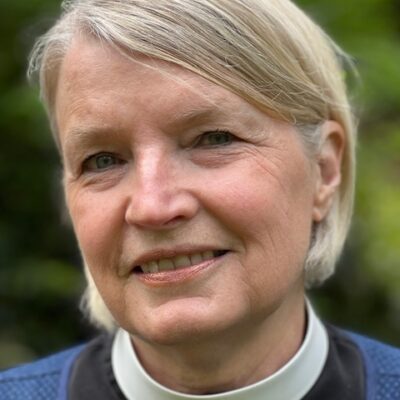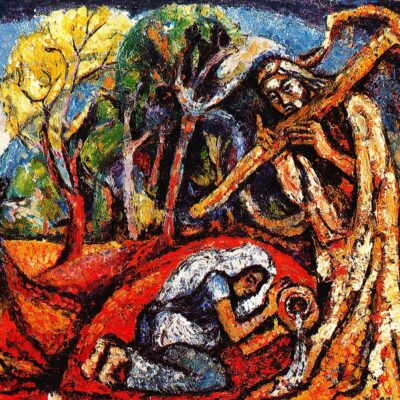Last week, Sara told about being bullied online for the church’s ministry of feeding the unhoused. The hope of the bullies, she said, was that all the homeless people would go away, all the drugs and alcohol would disappear, and housed residents would be able to enjoy the park, the library and the neighborhood without being troubled. The only thing we would have to do in order to get to this utopia would be to dispose of the people who do not conform to the complainers’ ideas about who should be allowed to be here. This notion depends on two things: first, that people should be able to get their way through threats and intimidation; and second, that there is a class of people we could categorize as disposable, or as discards. (As you may have read, the park here was swept recently and the tents removed, but some of the people are still here.)
It is undeniably true that in many times and places the Church itself, or portions of the Church, have agreed that there are disposable people, people whom God views as discards. One of the verses that gets used as a proof text for that opinion is one we just read: Jesus said to Thomas, “I am the way, the truth and the life. No one comes to the Father except through me.” I would add that when Jesus uses the term “Father” he is talking, not about the gender of God, but about the role of the father in his society, which was to nurture and guard the inheritance for the sake of the children.
This Scripture means, we are told by some Bible interpreters, that we have to make a decision to turn to Jesus. In order to be saved from damnation we have to acknowledge our sinful natures, accept Jesus Christ as Lord, and thereby receive God’s salvation. Many of those who believe in that route to salvation have put a lot of more progressive Christians to the test by spending time in the gutters and the alleys with the poor, the addicted and the outcasts. I’m not going to speak of that group. The ones I am concerned about are those who think of those on the outside as rejects, disposable, discards, along with all of us who don’t accept their theological position. They think that God doesn’t have anything for us; God doesn’t want to do anything for us. Those who don’t claim salvation by this formula are never heard by God, never acknowledged by God, never have prayers answered by God.
For Christians who don’t like that interpretation, this passage from John becomes a Scripture we might want to avoid, because that is what it seems to say. If you want to proof-text the notion that God only saves people who go through this kind of conversion experience, only cares about people who do, this is one of the places you go. If you don’t want to accept that sectarian approach to Christianity, this scripture can make you squirm, because to you that viewpoint of God’s activity is too exclusivist and limiting. It seems to propose high walls, behind which are God’s elect and outside of which are the damned, and only those who follow the proper formula end up on the inside. Those who get to go where Christ went are the only ones God works with and cares about. So what do you do with a scripture like that if you don’t like that point of view? It seems to present that thinking pretty clearly, doesn’t it?
But there is a question we need to ask of this scripture rather than simply dodging around it if we don’t like that conclusion. And don’t get me wrong, please: I am absolutely in favor of acknowledging our sinfulness and asking Christ to rule in our hearts. I recommend it. It was what God moved me to do when I first met Jesus Christ as a real, living person who is the revelation of God in the flesh, as he tells his disciples in this passage of Scripture, and it is what started me on my adult religious and spiritual pathway.
But, back to the question I want to pose. Does this salvation experience, this way and truth and life that leads us to the Father, come from something Jesus does or something we do? Or is it some combination of those two things? With that in mind, what about this scary phrase, “No one comes to the Father except through me”? Does that mean heaven is closed to us, salvation is closed to us, the pathway to God is closed to us, unless we respond according to some formula? Or does it simply mean, as I would hold, that Jesus has acted, Jesus has opened the way to the Father? That is, this passage refers more to something Jesus does, not something we do.
If we are going to use this verse to close the Kingdom of Heaven to those who don’t follow the formula, we have to ask ourselves what example Jesus set. Who was he with? To whom did he preach mercy and forgiveness? For whom was he trying to open the kingdom of heaven? Wasn’t it primarily the people who had been battered by life, who had been possessed by evil and didn’t know how to escape, the ones whose consciences were heavy, who lived with guilt and regret, the ones who had been disregarded, rejected and discarded by the people in power?
And who did he warn that they were in danger of losing the Kingdom of Heaven? Wasn’t it those who ignored the poor at their feet, who used their freedom to deny freedom to others, who exploited the poor and the lower classes, who scorned those who were not like them, who denied that they had anything that needed to be cleared up with God?
Where do these questions take you? They take me back to the people who are served by Edible Hope Kitchen and the people who serve them there. I ask myself, if Jesus were in Ballard would he be found eating with the poor, the addicted, the hungry, those whose lives have gotten beyond their ability to control? Yes, of course. I say that while acknowledging that Jesus also spent time with those who didn’t accept his viewpoint about the value of people who weren’t doing well. He longed for the rich and powerful, too, to be among those who had places prepared for them, and he tried to tell them about the value of the poor, those whose lives were no longer in control, those who were unable to understand how to make their lives work right.
We read of the martyrdom of St. Stephen from the Book of Acts this morning. Stephen, the first martyr of the church, was also one of the first Deacons. The charge to Deacons was to bring food to widows and orphans, but they soon began adding preaching the Gospel to their job descriptions. The two were connected, as they understood the Christian faith in terms of what they had seen Jesus do. The Gospel, to them, meant good news to the poor, both in proclaiming and in serving.
Another Deacon is one of my favorite saints, Lawrence. Lawrence had been given control of money and valuables of the church in the days that Rome was persecuting Christians. Lawrence used those valuables to help the poor. The Romans arrested him and, knowing that he had been given those treasures, demanded that he turn them over in order to save his own life. They told him a day and time he had to appear with the treasures of the church. On that day, he showed up along with some of the poor people he had helped, and pointing to them, he told the Roman official, “Here are the treasures of the church.” He tried to educate the Romans in the ways of God, but unfortunately they did not appreciate his lesson and made a martyr of him.
We are members of a church that understands St. Lawrence’s point of view even though we don’t always follow it. We are members of a church that gives to the poor and at the same time asks God’s blessings on all.
When we are asked to choose between those whom society describes as acceptable, and those who are rejected and set aside, we have to respond that we do not choose. Jesus opened the way to the Father for all of us. Yes, he did provide us with a choice, to accept his example, his divinity, and his values or not. He was a revolutionary not in the sense of wanting to overthrow or destroy those in power, but because he wanted to turn the whole value system on its head.
In Jesus’ universe the value system of the world is turned upside down. Jesus did not turn to society’s elite to make up his core followers: he chose from the poor, the working class and the sinners; the outcasts. The poor and the sinful, as they were termed, those who are discriminated against, he taught, go into heaven before the rulers, the teachers and the leaders. He came, he said, to seek out the lost, the sick, the injured, those in prison, the children, the poor, the sinners. He did not come to make us recite a formula by which we would become the elite or the inner circle. He came to show us the Father, and having shown us the Father, demonstrated what the Father wants to do and wants us to do by what he himself did. He came to make us the family of God, heirs of the Kingdom, disregarding all the artificial values that society placed on people’s worth.
The movement called Liberation Theology, which you may remember, talked about a “preferential option for the poor.” That didn’t mean God liked poor people better than rich people. It meant that the poor need more help in life than the rich do, and asks us to live and work accordingly.
Jesus told his disciples that if they had seen him, they had seen the Father. If we have seen the Father in him, we have seen what the Father wants to do, and wants us to do. He has shown us that the Father values us all beyond price, and if we are to follow the Father we, too, have to value each one beyond price.
I read a story one time – unfortunately I forget who told it – about a Benedictine Monk who was taught, as all Benedictines are, that all visitors are to be received as if he were receiving Christ. He said that he had occasions when he was worn out, ready to quit for the day, only to see someone coming to the monastery, and in his weariness would say to himself, “Oh, Jesus Christ, is it you again?”
Yes, the world God has set us into can be wearying and discouraging. But yes, it is Jesus Christ who we meet again, in the person of these travelers through life, whom we are asked to bless, to comfort, to feed, to teach, to set free. Jesus has shown us the Father and told us that he, himself, is the way to the Father, and the truth about the Father, and the source of life from the Father to us. This is Jesus’ action much more than ours. We are asked to love even when love is wearying and difficult, as well as when it is liberating and joyous.
Jesus said that if we ask anything in his name, he will do it. This doesn’t mean I can say “God give me a Rolls Royce, in Jesus Name.” If you have tried that, you know how it goes. To ask something in Jesus name, by the tradition he is speaking from, means to ask something according to his will and authority. We ask for the lives and the freedom of those whom God has put at our doors.






